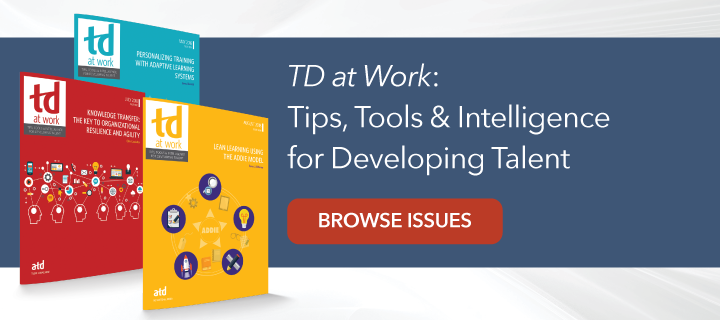Emotional intelligence (EI) is a person’s understanding of their emotions, management of those emotions, ability to recognize others’ emotions and behavior, and using this understanding to manage relationships, explain Joann Farrell Quinn and Sarah Hoffe in “The Importance of Emotional Intelligence in Healthcare.”
EI is critical in all professions. In healthcare today, when there are growing calls for a better patient experience, and where practitioners increasingly work in interdisciplinary teams with considerable doses of regular conflict, EI is crucial to one’s success. As Quinn and Hoffe write, “Within the healthcare industry, frontline personnel dealing with patients are reporting increased levels of stress, leading many organizations to offer resiliency training to help staff avoid burnout.”
How can a talent development professional who is working with healthcare clients help those practitioners hone their emotional intelligence?
First, it’s important to recognize that EI encapsulates several competencies. In terms of the “self,” EI is made up of self-awareness and self-management, the latter of which includes other competencies—that is, emotional self-control, adaptability, achievement orientation, and a positive outlook. The social, or “other,” is comprised of social awareness, which involves empathy and organizational awareness, and relationship management, which consists of coach and mentor, inspirational leadership, influence, conflict management, and teamwork.
A talent development professional can help a healthcare practitioner incorporate strategies to focus on self-management and self-replenishment. One way to do so is by keeping track of energy boosters and energy drainers.
- Energy boosters are those things that give a person energy. They don’t have to take a long time or be expensive. Things that help a person feel happy are energy boosters—such things as spending time in nature, date night with a partner, or a walk are examples of potential energy boosters. Ask your client, “What energy boosters are you willing to add to your current schedule?”
- Energy drainers are things that deplete a person’s energy. These might include routine tasks that could potentially be delegated to someone else, or constant interruptions. Ask your client, “What energy drainers can you remove from your day?”
Another avenue talent development professionals can use with their clients is to encourage them to focus on the problem, not the person. This can be useful in helping to manage conflict. Understanding the goals, perspectives, and emotions of others will help a healthcare practitioner in the relationship management realm of EI.
Using a journal or smartphone to write down where others might be coming from, or to check-in with oneself to become more self-aware are useful practices for healthcare practitioners and all professionals. Benefits include better relations with others, and a clearer understanding of self.
Want to learn more, check out the June bonus issue of TD at Work, “The Importance of Emotional Intelligence in Healthcare.”




